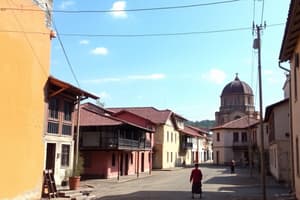Podcast
Questions and Answers
What is the primary tool of historians for understanding the past?
What is the primary tool of historians for understanding the past?
- Secondary sources
- Primary sources (correct)
- Personal narratives
- Tertiary sources
External criticism examines the truthfulness of the content of the evidence.
External criticism examines the truthfulness of the content of the evidence.
False (B)
Who accompanied Ferdinand Magellan in his circumnavigation of the world?
Who accompanied Ferdinand Magellan in his circumnavigation of the world?
Antonio Pigafetta
Which of the following is NOT a primary source mentioned in the text?
Which of the following is NOT a primary source mentioned in the text?
Antonio Pigafetta's account provides insights into the character of the Philippines during the _______ period.
Antonio Pigafetta's account provides insights into the character of the Philippines during the _______ period.
What was a significant event described in Pigafetta's account?
What was a significant event described in Pigafetta's account?
What was the name of the islands that Pigafetta referred to as the Ladrone Islands?
What was the name of the islands that Pigafetta referred to as the Ladrone Islands?
What was one characteristic that Pigafetta noted about the people of the Ladrone Islands?
What was one characteristic that Pigafetta noted about the people of the Ladrone Islands?
How did Pigafetta describe the fruit called cocho?
How did Pigafetta describe the fruit called cocho?
What items did the natives provide to Pigafetta and his crew?
What items did the natives provide to Pigafetta and his crew?
What was the location of the Ladrone Islands in relation to Japan?
What was the location of the Ladrone Islands in relation to Japan?
What was the primary purpose of Magellan deciding to land on an uninhabited island?
What was the primary purpose of Magellan deciding to land on an uninhabited island?
Which of the following foods did Pigafetta specifically mention in his account?
Which of the following foods did Pigafetta specifically mention in his account?
What was Antonio Pigafetta's role in relation to Magellan's voyage?
What was Antonio Pigafetta's role in relation to Magellan's voyage?
What was a notable consequence of the Abandonment of Juan Serrano by the ship's crew?
What was a notable consequence of the Abandonment of Juan Serrano by the ship's crew?
How did Pigafetta's social status influence his narrative?
How did Pigafetta's social status influence his narrative?
What aspect of Pigafetta’s work is highlighted in its importance for historians?
What aspect of Pigafetta’s work is highlighted in its importance for historians?
What critical perspective should readers adopt when analyzing Pigafetta's account?
What critical perspective should readers adopt when analyzing Pigafetta's account?
What does the term 'purest' refer to in the context of Pigafetta's writings about pre-colonial society?
What does the term 'purest' refer to in the context of Pigafetta's writings about pre-colonial society?
Which perspective should one consider when reading Pigafetta’s description of the people he encountered?
Which perspective should one consider when reading Pigafetta’s description of the people he encountered?
What role did Pigafetta serve during the expedition he documented?
What role did Pigafetta serve during the expedition he documented?
What significant limitation should historians recognize regarding Pigafetta's chronicles?
What significant limitation should historians recognize regarding Pigafetta's chronicles?
How did Pigafetta perceive the clothing of the indigenous people?
How did Pigafetta perceive the clothing of the indigenous people?
What economic system characterized 16th century Europe as mentioned in the content?
What economic system characterized 16th century Europe as mentioned in the content?
What material did Pigafetta note was used in the construction of native houses?
What material did Pigafetta note was used in the construction of native houses?
What did Pigafetta repeatedly highlight in his account regarding the indigenous culture?
What did Pigafetta repeatedly highlight in his account regarding the indigenous culture?
How did the European perspective of Pigafetta influence his assessments of indigenous cultures?
How did the European perspective of Pigafetta influence his assessments of indigenous cultures?
What does Pigafetta’s fascination with gold indicate about his views?
What does Pigafetta’s fascination with gold indicate about his views?
What cultural belief of Europeans in the 16th century did Pigafetta’s views reflect?
What cultural belief of Europeans in the 16th century did Pigafetta’s views reflect?
What commonly reported feature of the indigenous leaders did Pigafetta note?
What commonly reported feature of the indigenous leaders did Pigafetta note?
What is the primary purpose of the Kartilya ng Katipunan?
What is the primary purpose of the Kartilya ng Katipunan?
How did the Kartilya ng Katipunan respond to colonial hierarchy?
How did the Kartilya ng Katipunan respond to colonial hierarchy?
What can be inferred about the context of the Kartilya ng Katipunan?
What can be inferred about the context of the Kartilya ng Katipunan?
What does the term 'confederated brethren' imply in the context of the Kartilya?
What does the term 'confederated brethren' imply in the context of the Kartilya?
What is a significant value reflected in the fourth and the thirteenth rules of the Kartilya?
What is a significant value reflected in the fourth and the thirteenth rules of the Kartilya?
Which statement best describes the ultimate aspiration mentioned in the Kartilya?
Which statement best describes the ultimate aspiration mentioned in the Kartilya?
Which aspect of the Kartilya indicates that it is a primary source for understanding the struggles of its time?
Which aspect of the Kartilya indicates that it is a primary source for understanding the struggles of its time?
What does the term 'unjust hierarchy' signify in the context of the Kartilya?
What does the term 'unjust hierarchy' signify in the context of the Kartilya?
Which group is specifically mentioned as having avarice and greed in the passage?
Which group is specifically mentioned as having avarice and greed in the passage?
What significant event was condemned as unjust in the document?
What significant event was condemned as unjust in the document?
Which event led to the execution of the three native priests in 1872?
Which event led to the execution of the three native priests in 1872?
What does the proclamation suggest about the conditions faced by the Filipino people under Spanish rule?
What does the proclamation suggest about the conditions faced by the Filipino people under Spanish rule?
What was the effect of the collapse of the Pact of Biak-na-Bato?
What was the effect of the collapse of the Pact of Biak-na-Bato?
How did the document describe the response of Spanish forces to the revolution?
How did the document describe the response of Spanish forces to the revolution?
What leadership structure did the proclamation establish for the newly independent nation?
What leadership structure did the proclamation establish for the newly independent nation?
In what context is the phrase 'innocent blood was shed' used in the document?
In what context is the phrase 'innocent blood was shed' used in the document?
Flashcards are hidden until you start studying
Study Notes
Primary Sources in Philippine History
- Primary sources are crucial for historians to understand and interpret the past.
- Primary sources include documents, memoirs, accounts, and materials produced during the period being studied.
- Primary sources can be analyzed through external criticism (examining their authenticity) and internal criticism (evaluating their truthfulness and context).
- Context of production is vital to understanding historical facts: facts are not created in isolation and reflect the time and people who produced them.
Exploring Primary Sources
- The chapter examines various primary sources from different historical periods in the Philippines.
- The primary sources selected are:
- Antonio Pigafetta's First Voyage Around the World
- Emilio Jacinto's Kartilya ng Katipunan
- The 1894 Declaration of Philippine Independence
- Political Cartoons by Alfred McCoy in Philippine Cartoons: Political Caricature of the American Era (1900-1941)
- Corazon Aquino's Speech Before the US Congress
Pigafetta's First Voyage Around the World
- Pigafetta's travelogue is a significant primary source for understanding pre-colonial Philippines.
- The book was compiled from chronicles of 16th-century voyagers and navigators, including the Italian nobleman Antonio Pigafetta, who accompanied Ferdinand Magellan on his circumnavigation.
- Pigafetta's account provided insights into:
- Magellan's arrival in the Philippines
- His encounters with local leaders
- His death in the Battle of Mactan
- The departure of Magellan's fleet from the islands.
- It offers European perspectives on unfamiliar terrain, environment, people, and culture in the Philippines.
- The account's context helps understand how Europeans viewed the unknown.
Pigafetta's Chronicle and the Age of Exploration
- Pigafetta's account is a primary source written from his perspective as a participant in Magellan's expedition.
- Pigafetta was commissioned by the King of Spain to document the voyage, which was intended to expand the Spanish empire.
- The text reflects Pigafetta's noble background, his knowledge of cartography and geography, and his European worldview.
Pigafetta's Account of the Ladrones and Samar
- Pigafetta refers to the Ladrones Islands as inhabited by "thieves" who used sticks with fish bone tips as weapons.
- The Ladrones Islands are now known as the Marianas Islands.
- The fleet reached Zamal (Samar) but landed on another island for security.
- Natives welcomed them with food, drinks, and gifts, including fish, palm wine, figs, cochos, and rice.
- Pigafetta described the palm tree bearing cocho fruit and the wine, and a coconut-like fruit.
- A tragic incident occurred where natives killed all but two of the men sent ashore except the interpreter and a wounded man.
Analyzing Pigafetta's Account
- Pigafetta's account is often cited as a source for pre-colonial Philippine history, but it should be read within its context.
- Pigafetta's narrative reflects his European perspective, including his belief in the superiority of Christianity and European culture.
- Pigafetta's descriptions of indigenous beliefs and ways of life often express his amazement and perceived illiteracy.
- Pigafetta emphasized European technology and goods, as well as the abundance of spices and precious metals.
- Pigafetta's observations of indigenous dress and materials were influenced by European standards and climate.
- The era's dominant influences on Pigafetta's account include the Holy Roman Empire, which sought to spread Catholicism worldwide and viewed other belief systems as blasphemous and barbaric.
- The 16th-century European economic system focused on accumulating precious metals, influencing Pigafetta's descriptions of gold abundance in the islands.
The "Kartilya ng Katipunan" as a Primary Source
- The Kartilya is a document written by the Katipunan, a revolutionary organization dedicated to overthrowing Spanish colonial rule.
- Analyzing the Kartilya requires understanding its content and context, recognizing it as a response to the value systems.
- The Kartilya champions equality among men regardless of race, occupation, or status, challenging the existing racial and social hierarchy.
- It criticizes the unequal legal protections between Filipinos and Europeans and condemns the avarice and greed of the clergy.
- The Kartilya denounces unjust deportation and decisions rendered without proper hearings.
- It narrates the spread of the Katipunan movement throughout various provinces, highlighting the quick decline of Spanish forces.
- The document mentions Rizal's execution, condemning it as unjust and fueled by the friars' desire for revenge.
- It recounts the Cavite Mutiny and the execution of native priests, blaming the friars' machinations for the incident.
- The proclamation asserts the new republic's leadership under the dictatorship of Emilio Aguinaldo.
Studying That Suits You
Use AI to generate personalized quizzes and flashcards to suit your learning preferences.




